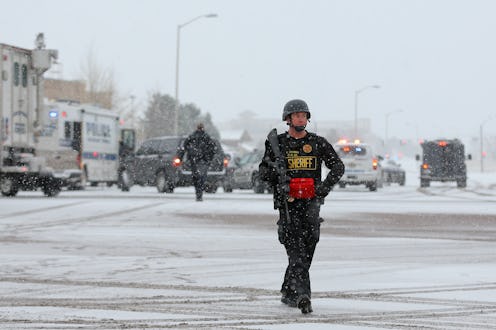News
The Colorado Springs PP Had Security Concerns
As more information emerges about the man suspected of starting an hours-long shootout with police inside a Planned Parenthood in Colorado Springs, Colorado, on Friday, people are calling for more investigation and scrutiny of widespread attacks on Planned Parenthood clinics. Violent attacks on Planned Parenthoods aren't new; even the Planned Parenthood in Colorado Springs had security concerns prior to Friday's attack, according to The New York Times.
The shooting between police and the gunman left three people dead and nine wounded after five hours of exchanged fire, according to the Times. Robert Lewis Dear, the suspected shooter, has been taken into custody by police. Police initially didn't have a motive for the alleged shooter's actions, but, in later interviews with investigators, Dear reportedly talked about "baby parts" and expressed views against abortion and the government, according to CNN. It's unclear whether there's strong enough evidence that these views were the suspect's sole motivation, but it wouldn't be the first time that anti-abortion extremism has led to violence.
Since 1993, eight abortion doctors and providers have been murdered, according to the National Abortion Federation. The three people who died Friday were the first deaths linked to reproductive healthcare centers since the murder of Dr. George Tiller in 2009, according to Mother Jones. Tiller was murdered at his church in Wichita, Kansas, and Scott Roeder, who was found guilty of his murder, said he shot Tiller because "preborn children's lives were in imminent danger."
Deceptive sting videos released by the Center for Medical Progress in July haven't helped clinic safety recently. The FBI reported an increase in attacks on reproductive healthcare clinics since the release of the videos, according to Mother Jones. And, things have been even worse for the Colorado Springs clinic because it was featured in the deceptive videos.
Bryan Hawke, a chiropractor whose office is across the parking lot from the Colorado Springs clinic, told the Times the clinic sees protests about six days a week, some of which draw up to 200 people. The Times reported that the clinic had security concerns prior to the shooting — the clinic even reportedly had a safe room with bulletproof vests — though the newspaper doesn't specific specific incidents that led to these concerns.
However, number and extreme nature of some anti-abortion protesters in Colorado may have been among the clinic's concerns. As many as 300 people protested outside of the clinic on Aug. 22, the day for nationwide protests calling to defund Planned Parenthood. And at least one of the protesters, Joseph Martone, had been arrested three times and convicted of trespassing once for getting too close to the clinic and the patients who were trying to go inside, according to Colorado Springs newspaper The Gazette. At the time, he told The Gazette that he protested at the clinic several days a week with the goal of stopping abortions.
David S. Cohen, a law professor and co-author of Living in the Crosshairs: The Untold Stories of Anti-Abortion Terrorism, told MSNBC that anti-abortion protesters in Colorado are so extreme that the Supreme Court upheld an eight-foot bubble zone around patients entering abortion clinics in 2000:
The fear is an everyday thing. Colorado is home to some of the most extreme members of the anti-abortion movement.
The devotion — and, occasionally, extremism — exhibited by anti-abortion protesters outside of the Colorado Springs Planned Parenthood and other Colorado clinics isn't unique. People who provide women's healthcare at Planned Parenthoods have been targeted and harassed for decades. Sadly, the more we ignore the arsons and cases of vandalism at clinics, the greater the chance for escalation in the future.
